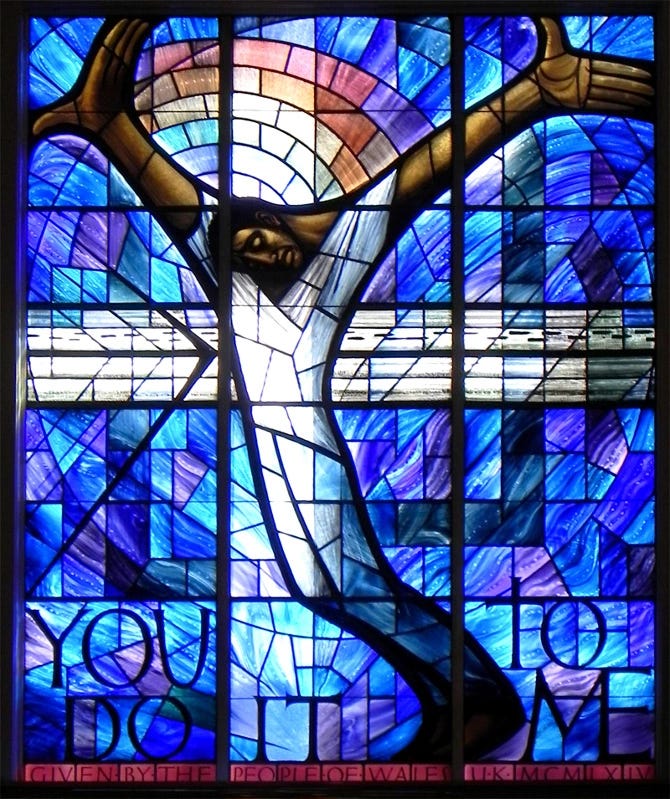Sixty Years Ago Today
The hard-earned lessons taught to us by our brothers and sisters in Birmingham after this incredibly dark moment in our history *deserve* to be listened to.
Sixty years ago today,
on Sunday, Sept. 15, 1963,
a bomb planted by four Ku Klux Klan members outside the 16th Street Baptist Church in Birmingham, Alabama detonated.
It killed four young girls who were on their way to Sunday school.
A horror among horrors.
Violence.
Toward *children*
In their *church*
Nearly 4,000 miles away, a youth group in Wales heard of this tragedy and began raising money to help with repairs. They commissioned a local Welsh artisan named John Petts, who made this remarkable piece of art.
The stained glass (pictured above) now fills the place the bomb tore apart.
Beauty for ashes.
What a stunning work. Jesus, head bloodied and bowed under the weight and heaviness of the brokenness and sin of this world. His feet are almost not even on the cross. They are muddy with the dirt of incarnation. God, choosing to walk among us, down here, in *this* sometimes very dark world.
With one hand, Jesus is pushing back the darkness and evil. This is what He does. Righteous, in all things. The only one.
Jesus' other arm is outstretched, like an embrace, as though He is gathering people to Him. Or offering forgiveness? Come. Come to me. Between his arms, a rainbow, a symbol of God's covenant with humanity. And the words, taken from Jesus in Matthew 25.
"You do it to me."
A bit of a twist on Jesus' words and meaning in that passage, but worth reflecting on. Our ugliness toward one another hurts other people, yes. And it will deforms us, yes. But it also - and primarily - wounds the heart of God Himself. We need cleansing. We need God's help for cleansing. And we need God to forgive us, before we can even begin to forgive one another.
The sermon planned for that morning by Rev. John Cross was titled, “A Love That Forgives.” The congregation would need it more than they ever knew. And they'd have to live it out, in ways that still inspire. His daughter, Barbara, reflecting on the lessons from that morning, once said this:
“I used to say this, ‘May men learn to replace bitterness and violence with love, love, love, love.’ I said it four times in memory of each girl.”
Forgiveness is the opposite of vengeance, in the teachings of Jesus. But forgiveness is not the opposite of justice. They dance together, but forgiveness must come first. Otherwise, we will seek to destroy the one who has wronged us. And that hatred will warp and destroy us.
I’m not just talking about civil society, either. I see this destroying people’s lives up close and personal, too. Look, I don’t know if you’ve been wronged. I bet you have. You’re human after all. Maybe you’ve been deeply wronged. Deeply hurt. Abandoned by someone who you really needed to have stayed. Or hurt by the very person you trusted to keep you safe. Or betrayed by someone you had been nothing but loyal to.
I know you didn’t deserve it, either.
But no matter what you’re dealing with, I have to believe that the hard-won lessons from the brothers and sisters of the 16th Street Baptist church about forgiveness can help, because they’re from Jesus Himself.
Because you have been forgiven.
Civil Rights Legend (and preacher) John Lewis put it like this in his book of essays published posthumously in 2020:
“Forgiveness plays a powerful role here because it paves the way for reconciliation and love. In the movement, we did not seek retaliation or revenge against our attackers, because we recognized that we could not harm them without harming ourselves. We saw them as wayward brothers and sisters who had lost their way.” *
NOTE: The family of Carole Robertson, a 14-year-old African American girl killed in a church bombing, attend graveside services for her, Sept. 17, 1963, Birmingham, Ala. (AP Photo/Horace Cort)
I'll close with a poem I used to teach in English class. It still affects me.
THE BALLAD OF BIRMINGHAM
by Dudley Randall
“Mother dear, may I go downtown
Instead of out to play,
And march the streets of Birmingham
In a Freedom March today?”
“No, baby, no, you may not go,
For the dogs are fierce and wild,
And clubs and hoses, guns and jails
Aren’t good for a little child.”
“But, mother, I won’t be alone.
Other children will go with me,
And march the streets of Birmingham
To make our country free.”
“No, baby, no, you may not go,
For I fear those guns will fire.
But you may go to church instead
And sing in the children’s choir.”
She has combed and brushed her night-dark hair,
And bathed rose petal sweet,
And drawn white gloves on her small brown hands,
And white shoes on her feet.
The mother smiled to know her child
Was in the sacred place,
But that smile was the last smile
To come upon her face.
For when she heard the explosion,
Her eyes grew wet and wild.
She raced through the streets of Birmingham
Calling for her child.
She clawed through bits of glass and brick,
Then lifted out a shoe.
“O, here’s the shoe my baby wore,
But, baby, where are you?”
*Lewis, John. Across That Bridge (p. 148). Grand Central Publishing.






